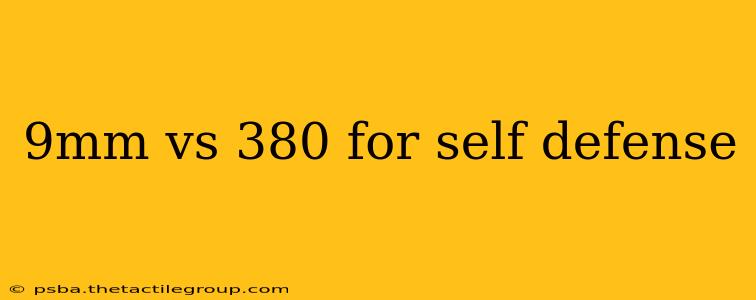Choosing a firearm for self-defense is a deeply personal decision, and caliber selection plays a crucial role. This article compares two popular choices – the 9mm and the .380 ACP – to help you make an informed choice. We'll delve into factors like stopping power, recoil, capacity, and concealability to provide a balanced perspective, emphasizing that the best choice depends heavily on individual needs and physical capabilities.
Stopping Power: The Key Difference
The most significant difference between the 9mm and .380 lies in their stopping power. Generally speaking, the 9mm offers superior stopping power due to its larger bullet diameter and higher energy transfer upon impact. This translates to a greater chance of incapacitating an attacker quickly. However, it's crucial to understand that "stopping power" is a complex issue influenced by shot placement, bullet type, and individual factors. While the 9mm statistically offers an advantage, precise shot placement remains paramount regardless of caliber.
Recoil and Shootability: A Matter of Control
Recoil is another key differentiator. The .380 generally exhibits less recoil than the 9mm. This makes it a more manageable option for individuals with less upper body strength or those new to firearms. Reduced recoil translates to faster follow-up shots, a critical factor in self-defense situations. However, the 9mm's recoil, while more noticeable, is still manageable for most adults with proper training and practice.
Magazine Capacity: Rounds in Reserve
Magazine capacity impacts the number of shots available before reloading. 9mm handguns typically offer higher magazine capacities than .380 pistols, providing more rounds in a self-defense encounter. While this might seem like a significant advantage, responsible gun ownership emphasizes accurate shot placement over sheer volume of fire. The extra rounds simply offer a safety margin.
Concealability: Size and Weight Considerations
For concealed carry, size and weight are paramount. .380 pistols are often smaller and lighter than 9mm handguns, making them easier to conceal comfortably under clothing. This is a crucial factor for individuals who prioritize discreet carry. However, advancements in 9mm technology have led to smaller, lighter 9mm handguns that are becoming increasingly popular for concealed carry.
Cost and Ammunition Availability: Practical Concerns
Both 9mm and .380 ammunition are readily available, but 9mm tends to be slightly less expensive. This difference can become significant over time, especially with regular practice and range trips. Availability is generally excellent for both calibers, reducing the risk of shortages in emergencies.
Choosing the Right Caliber: Individual Needs Matter Most
The "best" caliber for self-defense depends heavily on individual factors:
- Physical strength and shooting experience: Individuals with less upper-body strength or limited firearm experience may find the .380 more manageable.
- Concealability needs: If discreet carry is paramount, the smaller size and weight of the .380 might be preferable.
- Shooting proficiency: With proper training, a skilled shooter can effectively utilize either caliber.
Ultimately, the decision hinges on your individual needs, physical capabilities, and comfort level. Seek professional guidance from experienced firearms instructors and consider hands-on experience with both calibers before making your choice. Remember, responsible gun ownership involves thorough training, regular practice, and a deep understanding of applicable laws and regulations. This article is for informational purposes only and should not be considered professional advice. Always consult with qualified professionals before making any decisions about firearm ownership or self-defense.

